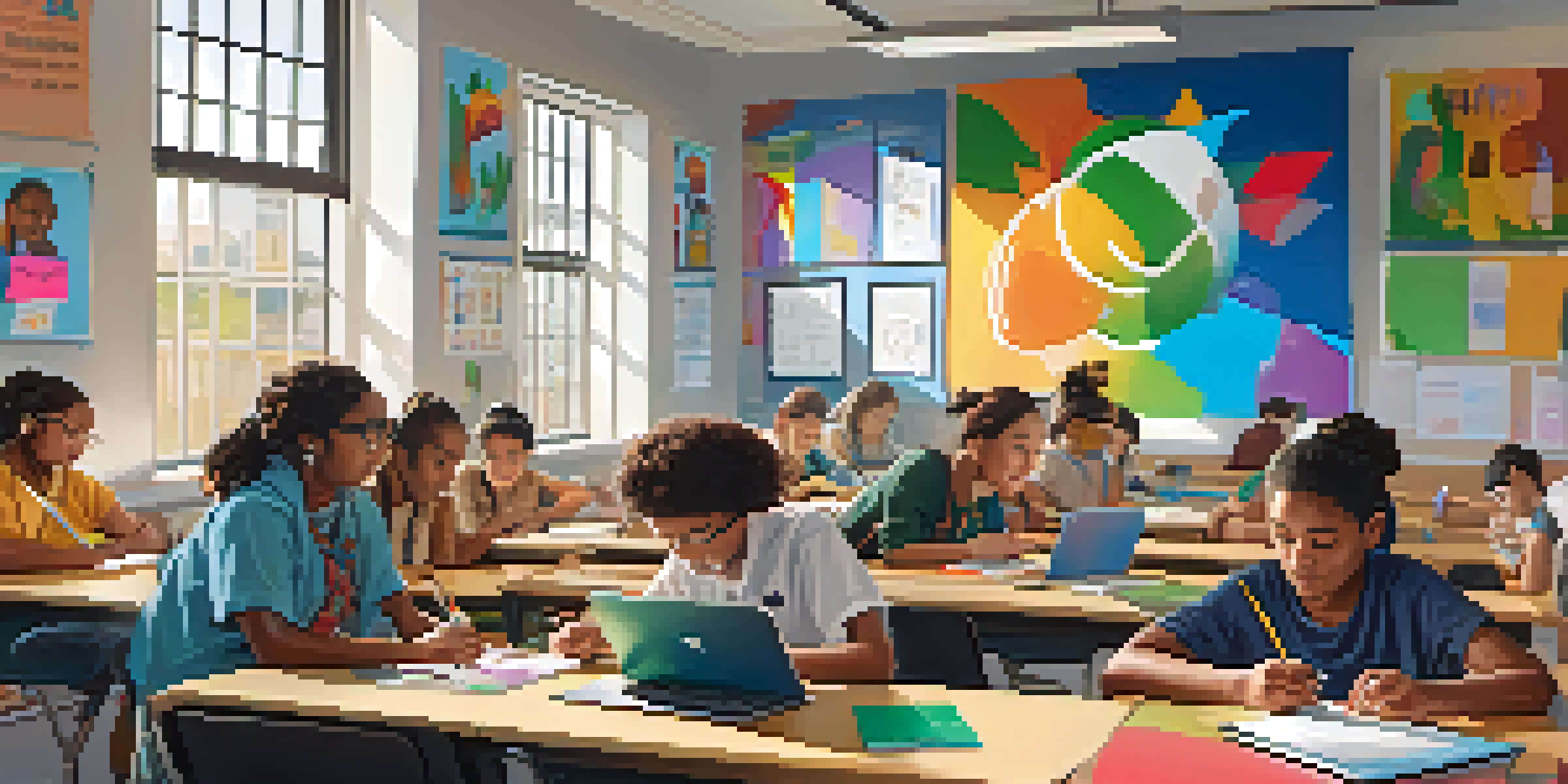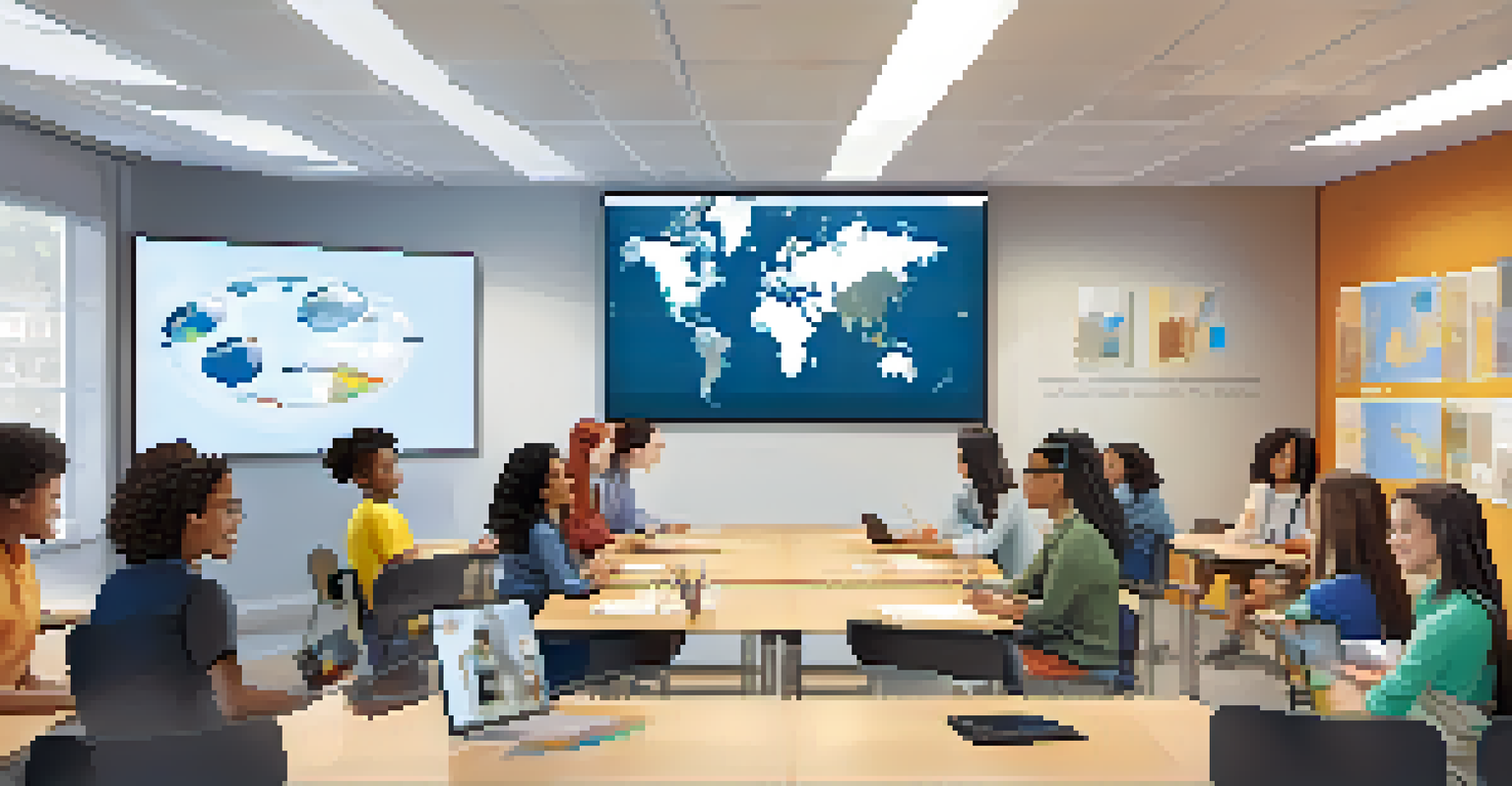Enhancing Global Education Through Intercultural Exchange

Understanding Intercultural Exchange in Education
Intercultural exchange in education refers to programs that facilitate the sharing of cultural experiences among students from different backgrounds. These programs can take various forms, including study abroad opportunities, virtual exchanges, and cultural immersion experiences. The primary goal is to foster understanding, respect, and collaboration across cultures, which is increasingly vital in our interconnected world.
Education is the most powerful weapon which you can use to change the world.
Imagine a student from Brazil spending a semester in Japan; not only does this student learn about Japanese language and customs, but they also share their own culture with their host family and classmates. This mutual exchange enriches both parties, creating a global community that thrives on diversity. Through these interactions, students develop essential skills such as empathy, adaptability, and global awareness.
Ultimately, intercultural exchange in education serves as a bridge, connecting students and institutions worldwide. As they navigate through unfamiliar settings, learners gain insights that textbooks alone cannot provide. It's this hands-on experience that prepares them for a globalized job market, where cultural competence is highly valued.
The Benefits of Intercultural Exchange Programs
Participating in intercultural exchange programs brings a plethora of benefits for students. Beyond academic growth, these experiences enhance personal development, allowing individuals to become more open-minded and culturally aware. Students often return home with a broader worldview, equipped to engage with diverse communities and tackle global challenges.

For instance, a student who participates in an exchange may return with improved language skills and a deeper appreciation for cultural nuances. These skills can lead to better communication and collaboration, whether in college or future workplaces. The experience also fosters lifelong friendships that transcend borders, creating a global network of support and collaboration.
Cultural Exchange Fosters Growth
Intercultural exchange programs enhance students' personal and academic development by promoting cultural awareness and global citizenship.
Moreover, educational institutions that prioritize intercultural exchange programs often see increased enrollment and enhanced reputation. By promoting cultural diversity, these schools attract students eager to learn in a rich, multicultural environment. This not only benefits the individual student but enhances the overall academic community.
How Intercultural Exchange Enhances Learning Outcomes
Intercultural exchange programs significantly enhance learning outcomes by providing students with real-world applications of their studies. When learners immerse themselves in a different culture, they engage in experiential learning, which reinforces theoretical knowledge. This hands-on approach promotes critical thinking and problem-solving skills, valuable in any professional setting.
The more that you read, the more things you will know. The more that you learn, the more places you'll go.
For example, students studying environmental science may work on sustainability projects in a different country, applying their classroom knowledge to real-world challenges. This not only solidifies their understanding of the subject but also encourages innovative thinking. Learning in diverse environments pushes students to question their assumptions and consider multiple perspectives.
Additionally, these programs often include collaborative projects with local students, fostering teamwork and intercultural communication. Such experiences prepare students to navigate complex, multicultural workplaces in the future. By enhancing learning outcomes, intercultural exchange programs contribute to well-rounded, capable graduates ready to make an impact.
Fostering Global Citizenship Through Education
Intercultural exchange plays a crucial role in fostering global citizenship among students. This concept goes beyond mere awareness of global issues; it involves an active commitment to understanding and addressing them. Through exchange programs, students learn to appreciate cultural diversity and recognize their responsibilities as global citizens.
For instance, a student engaged in community service during their exchange may witness firsthand the impact of social issues like poverty or climate change. This experience can ignite a passion for social justice, inspiring students to advocate for change in their own communities. They learn that their actions can contribute to a more equitable world, regardless of geographical boundaries.
Technology Enhances Accessibility
Virtual exchange programs leverage technology to make intercultural experiences more accessible, allowing students to connect globally without travel.
As students embrace their roles as global citizens, they develop a sense of accountability towards the world and its inhabitants. This mindset encourages them to engage in meaningful dialogues and collaborations that transcend cultural divides. Ultimately, fostering global citizenship through education cultivates a generation that values peace, justice, and sustainability.
Challenges of Implementing Intercultural Exchange Programs
While the benefits of intercultural exchange programs are abundant, there are also challenges that institutions must navigate. Funding is often a significant barrier, as many programs require substantial financial support for travel, accommodation, and educational resources. Without adequate funding, opportunities may be limited to only those who can afford them, creating disparities in access.
Moreover, cultural differences can pose challenges for participants. Students may face language barriers, different educational styles, and varying social norms, leading to feelings of isolation or discomfort. It's essential for programs to provide robust support systems to help students adjust and thrive in new environments.
Ultimately, addressing these challenges requires collaboration between educational institutions, governments, and communities. By working together to secure funding and support, we can create more accessible and inclusive intercultural exchange programs. This ensures that all students have the opportunity to benefit from these transformative experiences.
The Role of Technology in Intercultural Education
Technology has revolutionized the way we approach intercultural education, making it more accessible than ever before. Virtual exchange programs allow students to connect and collaborate with peers from around the world without the need for travel. This opens doors for those who may not have the means to participate in traditional exchange programs, democratizing access to intercultural experiences.
For example, a classroom in the United States can now engage in joint projects with students in Kenya, sharing their perspectives and learning from each other’s experiences. This virtual interaction fosters understanding and empathy, breaking down geographical barriers. It also equips students with digital communication skills essential for the modern workforce.
Future Focus on Inclusivity
There is a growing emphasis on sustainability and inclusivity in intercultural exchange programs, ensuring diverse access and equitable benefits for all participants.
However, while technology enhances accessibility, it cannot replace the value of in-person experiences. A blended approach that combines virtual exchanges with physical programs can offer the best of both worlds. By leveraging technology, we can create richer, more diverse educational experiences that prepare students for a globalized future.
Future Trends in Intercultural Exchange Programs
As we look to the future, intercultural exchange programs are evolving to meet the needs of a changing world. Increasingly, there is a focus on sustainability and ethical practices within these programs. Educational institutions are striving to ensure that exchanges benefit both students and host communities, creating a more equitable model for cultural exchange.
Moreover, there is a growing recognition of the importance of inclusivity in intercultural exchange. Programs are being designed to reach a broader demographic, ensuring that students from varied backgrounds have access to these enriching experiences. This is crucial for building a more diverse and representative global community.

Finally, as technology continues to advance, we can expect more innovative approaches to intercultural education. From virtual reality experiences to collaborative online courses, the possibilities are endless. These trends indicate a promising future for intercultural exchange, one that prioritizes accessibility, sustainability, and meaningful connections.